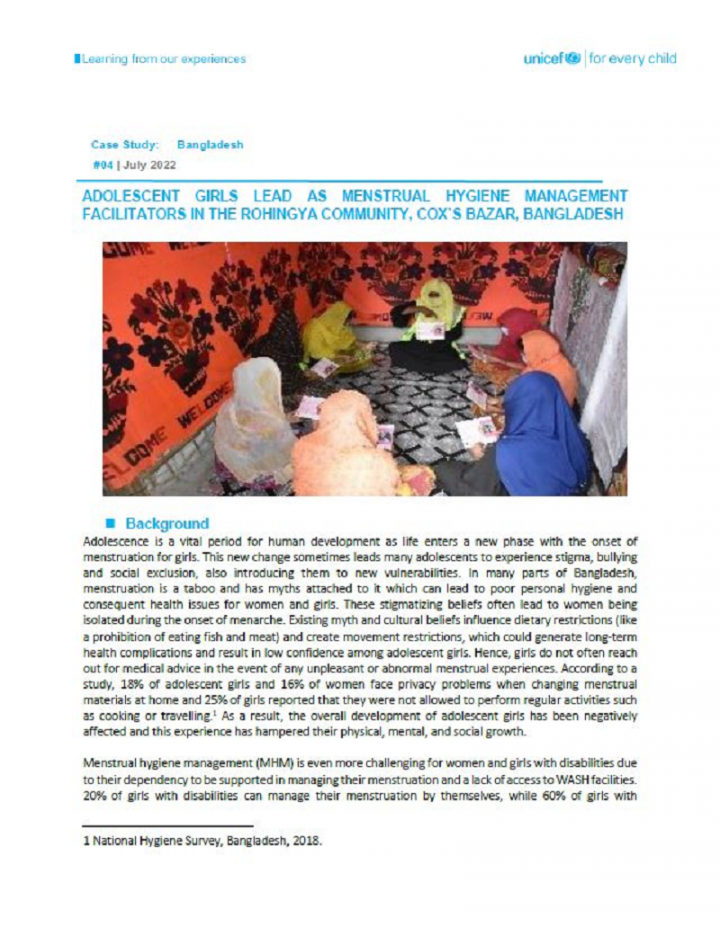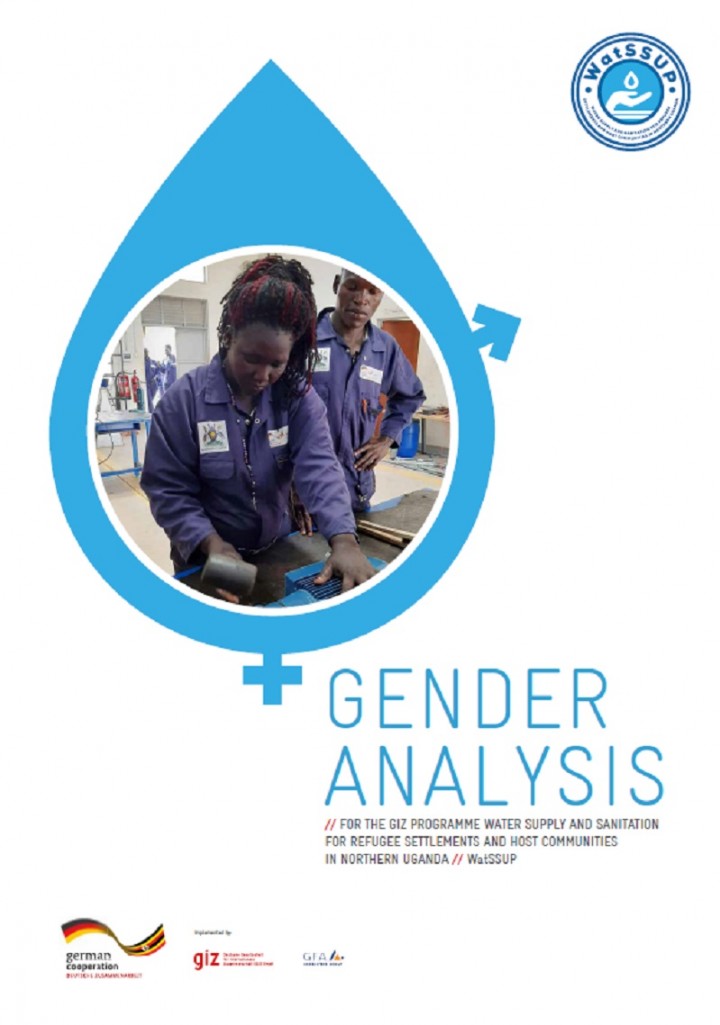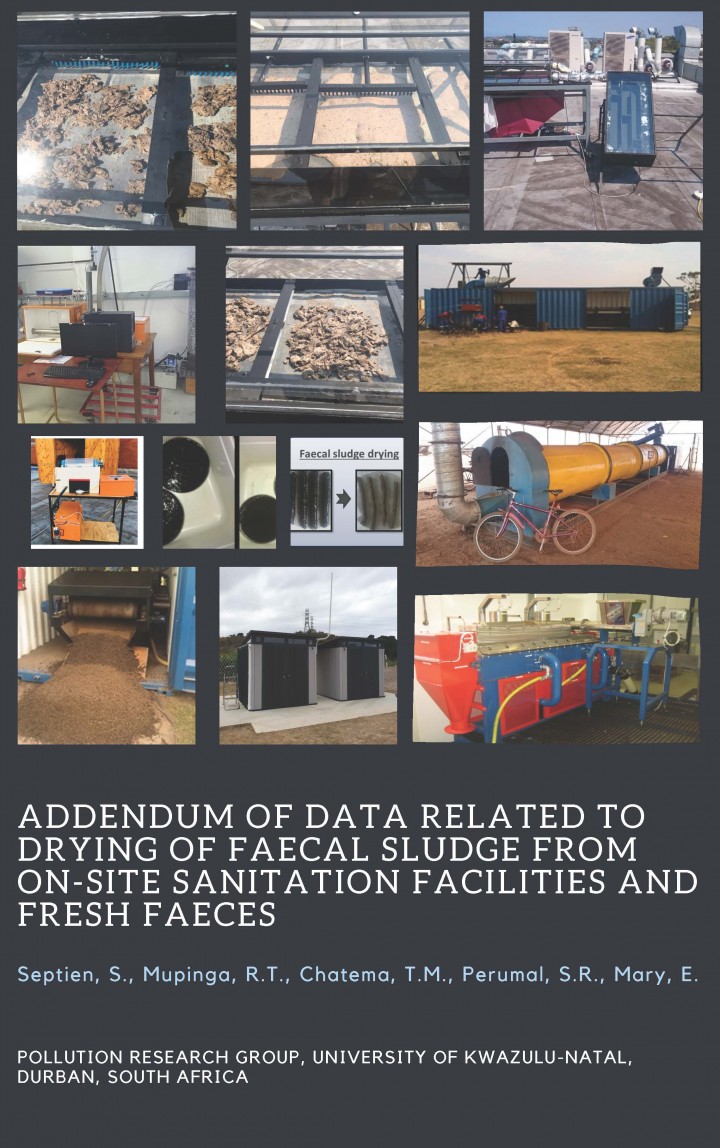Yesmin, K. (2022) ROHINGYA COMMUNITIES BENEFIT FROM PIPE WATER DISTRIBUTION NETWORKS IN THE CAMPS OF COX’S BAZAR, BANGLADESH
Globally, at least two billion people use a drinking water source contaminated with faeces1. As result of microbial contamination with faeces, it poses the greatest risk to drinking-water safety. In 2010, the UN General Assembly explicitly recognized the human right to water and sanitation. Everyone has the right to sufficient, continuous, safe, acceptable, physically accessible, and affordable water for personal and domestic use. Sustainable Development […]
Mamun, Z. (2022) PARADIGM SHIFT: THE HUMANITARIAN DEVELOPMENT NEXUS IN COX’S BAZAR DISTRICT, BANGLADESH
According to Joint Monitoring Programme, 58.5% have safely managed services for drinking water in 2020. One in five households has to spend more than 30 minutes fetching water from an outside source. The statistics also suggest a serious gap in sanitation facilities; about one-third of the households (31%) use unimproved toilet facilities; 22% of households use pit latrines without slabs, and 3% use a hanging […]
Begum, S. (2022) ADOLESCENT GIRLS LEAD AS MENSTRUAL HYGIENE MANAGEMENT FACILITATORS IN THE ROHINGYA COMMUNITY, COX`S BAZAR, BANGLADESH
Adolescence is a vital period for human development as life enters a new phase with the onset of menstruation for girls. This new change sometimes leads many adolescents to experience stigma, bullying and social exclusion, also introducing them to new vulnerabilities. In many parts of Bangladesh, menstruation is a taboo and has myths attached to it which can lead to poor personal hygiene and consequent […]
Khalid Azami, M. (2022) PROVIDING SOLAR POWERED WATER SUPPLY SYSTEMS TO PROMOTE SAFE DRINKING WATER AND HYGIENE IN MAIDAN WARDAK PROVINCE OF AFGHANISTAN
Afghanistan is affected by manmade and natural disasters, which have caused a significant displacement of people. People often move from their place of origin to cities and are settled in areas where access to safe drinking water is limited. In 2020, only 47.5 per cent of the population had access to basic drinking water services and 38.1 per cent had basic hygiene services1. As a […]
GIZ WatSSUP (2022) IMPROVING WATER AND SANITATION SERVICE DELIVERY // DISTRICT LEVEL
The GIZ Programme Water Supply and Sanitation for Refugee Settlements and Host Communities in Northern Uganda (WatSSUP) operates on the nexus of humanitarian and development work and focuses on both refugee and host communities. The programme is implemented under the special initiative on forced displacement of the German Federal Ministry for Economic Cooperation and Development (BMZ). This is in line with Germany’s commitment to international […]
GIZ WatSSUP (2022) ALTERNATIVE LATRINE AND HANDWASHING TECHNOLOGIES // DEMONSTRATION PLOTS
The GIZ Programme WatSSUP operates on the nexus of humanitarian and development work and focuses on both refugee and host communities. The programme is implemented under the special initiative on forced displacement of the German Federal Ministry for Economic Cooperation and Development (BMZ) and implemented by GIZ in line with Germany’s commitment to international burden and responsibility sharing under the UN Global Compact on Refugees. […]
GIZ WatSSUP (2022) GENDER ANALYSIS // FOR THE GIZ PROGRAMME WATER SUPPLY AND SANITATION FOR REFUGEE SETTLEMENTS AND HOST COMMUNITIES IN NORTHERN UGANDA // WatSSUP
The observations and recommendations presented in this gender analysis are meant to provide information to the programme regarding the relevance of gender aspects in Uganda, and particularly for the continued implementation process of the Programme: Water Supply and Sanitation for Refugee Settlements and Host Communities in Northern Uganda (WatSSUP).
GIZ WatSSUP (2022) WATER, SANITATION AND HYGIENE // SENSITIZATION AND AWARENESS EVENTS
The GIZ Programme WatSSUP operates on the nexus of humanitarian and development work and focuses on both refugee and host communities. The programme is implemented under the special initiative on forced displacement of the German Federal Ministry for Economic Cooperation and Development (BMZ) and implemented by GIZ in line with Germany’s commitment to international burden and responsibility sharing under the UN Global Compact on Refugees.
GIZ WatSSUP (2022) CASH FOR WORK // TREE PLANTING FOR WATER SOURCE PROTECTION
The WatSSUP Cash for Work (CfW) tree planting activity takes place between April and November 2022. It aims at improving the water source protection of water supply system catchment areas as well as delivering positive impact on household incomes. The activity covers a total of 18 acres in the West Nile Region in Northern Uganda. 9 acres of trees are planted in Yumbe district (Bidibidi […]
Septien, S., Mupinga, R.T., Chatema, T.M., Perumal, S.R., Mary, E. (2021) Addendum of Data related to Drying of Faecal Sludge from On-Site Sanitation Facilities and Fresh Faeces
The present document consists of an addendum of data to the Handbook of Methods for Faecal Sludge Analysis. It is part of a project funded by the Bill & Melinda Gates (BMGF) through the OPP1164143, untitled “Characterization of faecal material during drying”. This project was granted for funding after the 5-years Transformative Technologies convening at the BMGF headquarters in 2016, where drying was recognized as […]
University of Leeds (2022) SFD Lite Report – Gia Nghia, Vietnam
Gia Nghia is a small but quickly growing and urbanising town. 87% of households have water supply provided on premises with projects underway to bring this to over 90%, and 100% of the population has access to a sanitation system (no open defecation is reported). Waste stabilisation ponds were constructed to treat wastewater, but these are not operational due to a lack of connections to […]
Libby, J. A., Wells, E. C., & Mihelcic, J. R. (2020) Moving up the Sanitation Ladder while Considering Function: An Assessment of Indigenous Communities, Pit Latrine Users, and Their Perceptions of Resource Recovery Sanitation Technology in Panama
As households move up the sanitation ladder, health risks presumably decline but the corresponding technologies may require increasing operation and maintenance costs. One critique of the ladder is that it prioritizes technology and could be improved if it included a functional approach to monitoring, such as including aspects of environmental sustainability that consider resource recovery. Using analyses of data obtained from semi-structured interviews, surveys, and […]
Wells, E. C., Vidmar, A. M., Webb, W. A., Ferguson, A. C., Verbyla, M. E., de los Reyes III, F. L., ... & Mihelcic, J. R. (2022) Meeting the Water and Sanitation Challenges of Underbounded Communities in the U.S.
Water and sanitation (wastewater) infrastructure in the United States is aging and deteriorating, with massive underinvestment over the past several decades. For many years, lack of attention to water and sanitation infrastructure has combined with racial segregation and discrimination to produce uneven access to water and wastewater services resulting in growing threats to human and environmental health. In many metropolitan areas in the U.S., those […]
Naughton, C. C., Akers, P., Yoder, D., Baer, R., & Mihelcic, J. R. (2018) Can Sanitation Technology Play a Role in User Perceptions of Resource Recovery? An Evaluation of Composting Latrine Use in Developing World Communities in Panama
There remains a large unmet need for sanitation access throughout the world that compromises both human and environmental health. Opportunities exist to employ sanitation systems that better utilize and recover scarce resources from excreta such as water, energy, and nutrients. However, technologies such as a composting latrine may require more maintenance and close handling of feces compared to other sanitation technologies. This study aims to […]
Willetts, J Kumar, A, Mills, F (2022) Urban sanitation and climate change: A public service at risk Landscape study
The study provides recent advances and adaptations in policy, planning and service delivery to better manage climate related risks in urban contexts. It also identifies actionable strategies to support efforts to improve climate resilience in urban sanitation and to strengthen the argument for their implementation
IDB, D&A and EP (2022) SFD Report – Punta del Diablo, Uruguay
Punta del Diablo is located on the Atlantic Ocean coast of Uruguay in the department of Rocha. The city is made up of six large sub-divisions: Punta del Diablo, Coronilla del Mar, Aldea del Mar, Santa Teresa de la Coronilla, Parque Santa Teresa and Santa Teresa (D&A and EP, 2021). For this report, a total population of 23,128 is estimated. Comprising a resident population of […]
Oxford Policy Management on behalf of WSSCC (2016) Value for money study in Global Sanitation Fund programmes. Synthesis report
This report is the final output of the ‘Value for Money Study in Global Sanitation Fund Programmes’, hereafter ‘the VFM-GSF project’, funded by the Water and Sanitation Supply Collaborative Council (WSSCC)/Global Sanitation Fund (GSF). The stated objectives of the project were threefold: 1. To assess GSF-funded sanitation and hygiene implementation programmes to gauge current levels of economy, efficiency and effectiveness by applying standard VFM analysis procedures and […]
OECD (2019) Making Blended Finance Work for Water and Sanitation. Unlocking Commercial Finance for SDG 6
The OECD, with the support of the Swedish International Development Agency (Sida), has undertaken research to better understand the current and potential role of blended finance models for water-related investments. Considering the wide variety of potential types of water-related investments, this research takes a broad approach to water-related investment and covers blended finance models that contribute to the SDGs including, but not limited to, SDG […]
Inter-American Development Bank (2020) Innovations in Commercial Finance for the Water and Sanitation Sector: The Potential of Investment Platforms for Mobilizing Financing for Development at Scale
Massive amounts of investment are needed to meet the United Nations Sustainable Development Goals for water supply and sanitation. However, several challenges have limited the ability to mobilize commercial finance for the sector, including a complex political economy, high transaction costs and an unclear regulatory environment. Investment platforms are an online tool for bringing […]
Climate Policy Initiative (2021) The State of Cities Climate Finance
The 2021 State of Cities Climate Finance report examines the current state of urban climate investment, the barriers to reaching the needed investment levels, and the steps to overcoming these challenges. The report delivers its findings in two parts: The Landscape of Urban Climate Finance (Part 1). Authored by the Cities Climate Finance Leadership Alliance Secretariat (Climate Policy Initiative) in partnership with the Atlantic Council’s Adrienne Arsht-Rockefeller […]




















